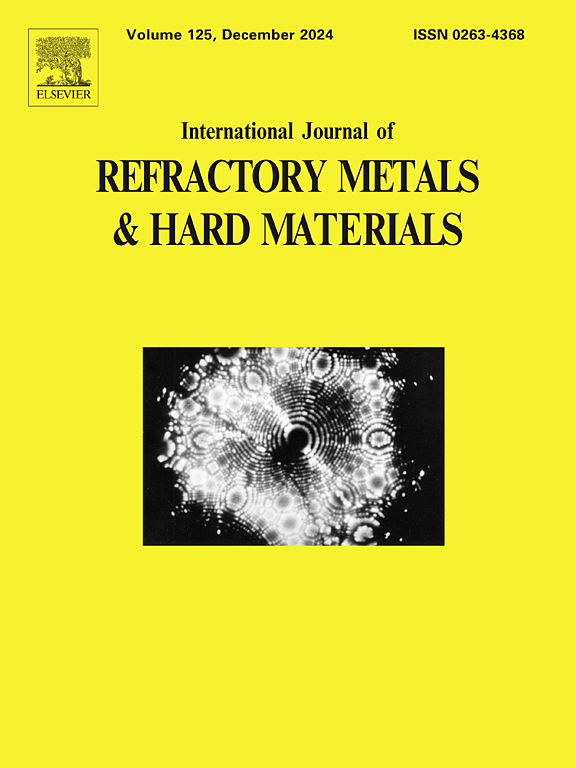工艺参数对铝基合金上生长 AlN 涂层的影响
IF 4.2
2区 材料科学
Q2 MATERIALS SCIENCE, MULTIDISCIPLINARY
International Journal of Refractory Metals & Hard Materials
Pub Date : 2024-11-01
DOI:10.1016/j.ijrmhm.2024.106944
引用次数: 0
摘要
半导体制造设备广泛使用铝合金,当铝合金暴露在半导体加工过程中使用的氟气中时,会形成 AlF 层。AlF 层会剥落,导致腔室部件无法用于半导体制造。为了抵御氟的侵蚀,研究人员对在 Al-6061 基材上生长保护性 AlN 涂层进行了研究,本文报告了工艺参数对涂层质量的影响。研究发现,在镁粉的放热氮化(燃烧)过程中,沿气流路径放置在样品之前的粉末床中的镁粉可向样品快速提供镁蒸汽。如果镁的过饱和程度、样品的温度和蒸汽在样品周围的停留时间足够高,过饱和镁蒸汽的爆发可以将样品表面的原生保护性 Al2O3 转化为非保护性氧化镁。同时,镁的过饱和度也不应过高,以免 Mg3N2 微粒在气相中大量成核,从而粘附在样品前缘,造成 "前缘异常"。通过使用双峰分布的镁粉可以达到这种平衡。Al2O3 向 MgO 的转化伴随着 MgO 层上方 Mg3N2 层的形成,表面覆盖不完全。微观结构分析表明,AlN 成核倾向于在 Mg3N2 层上,未覆盖区域是合金中向外扩散铝的区域。涂层向外生长,AlN 树枝向外和横向生长,从而在铝基体中形成具有 AlN 树枝网络的致密涂层。即使反应室中的氧气或水蒸气浓度很小,也会导致 AlN 涂层表面形成过量的氧化镁,尤其是在样品冷却期间。在涂层表面形成的过量氧化镁被称为 "氧化镁中毒",会抑制涂层的进一步生长。粉末床中的残余镁和 Mg3N2 可分别吸收氧气和水分,从而保持足够低的氧含量,以避免氧化镁中毒,前提是炉室具有良好的密封性。本文章由计算机程序翻译,如有差异,请以英文原文为准。
Effect of process parameters on the growth of AlN coatings on Al-based alloy
Semiconductor fabrication equipment extensively uses Al alloys which form an AlF layer when exposed to fluorine gas used in semiconductor processing. The AlF layer can flake off, rendering the chamber components unfit for semiconductor manufacturing. With the goal of resisting fluorine attack, the growth of protective AlN coatings on Al-6061 substrates was investigated, and this paper reports on the effects of process parameters on coating quality. It was found that Mg powders in a powder bed placed before the sample along the gas flow path can supply a rapid burst of magnesium vapor to the sample during exothermal nitridation (combustion) of Mg powders. This burst of supersaturated magnesium vapor can convert the native protective Al2O3 to non-protective MgO on the sample surface if the extent of magnesium supersaturation, the temperature of the sample, and the residence time of the vapor around the sample are high enough. At the same time, the magnesium supersaturation should not be so high as to get significant gas phase nucleation of Mg3N2 particulates that can stick to the front edge of the sample causing a ‘front edge anomaly’. This balance is achieved by using a bimodal distribution of magnesium powders. Conversion of Al2O3 to MgO is accompanied by the formation of a Mg3N2 layer above the MgO layer, with incomplete surface coverage. Microstructural analysis suggests that AlN nucleation is preferred on this Mg3N2 layer, with uncovered areas being regions of outward Al diffusion from the alloy. The coating grows outward with the AlN dendrites growing outwards and laterally leading to a dense coating with a dendritic network of AlN in an Al matrix. Even a small concentration of oxygen or water vapor in the reaction chamber leads to excessive MgO formation on the AlN coating surface, particularly during the sample cooldown. Excessive MgO formation on the coating surface, termed as ‘MgO poisoning’, inhibits further coating growth. The residual Mg and Mg3N2 in the powder bed getter the oxygen and moisture, respectively, thereby keeping the oxygen content sufficiently low to avoid MgO poisoning provided the chamber has good hermetic integrity.
求助全文
通过发布文献求助,成功后即可免费获取论文全文。
去求助
来源期刊
CiteScore
7.00
自引率
13.90%
发文量
236
审稿时长
35 days
期刊介绍:
The International Journal of Refractory Metals and Hard Materials (IJRMHM) publishes original research articles concerned with all aspects of refractory metals and hard materials. Refractory metals are defined as metals with melting points higher than 1800 °C. These are tungsten, molybdenum, chromium, tantalum, niobium, hafnium, and rhenium, as well as many compounds and alloys based thereupon. Hard materials that are included in the scope of this journal are defined as materials with hardness values higher than 1000 kg/mm2, primarily intended for applications as manufacturing tools or wear resistant components in mechanical systems. Thus they encompass carbides, nitrides and borides of metals, and related compounds. A special focus of this journal is put on the family of hardmetals, which is also known as cemented tungsten carbide, and cermets which are based on titanium carbide and carbonitrides with or without a metal binder. Ceramics and superhard materials including diamond and cubic boron nitride may also be accepted provided the subject material is presented as hard materials as defined above.

 求助内容:
求助内容: 应助结果提醒方式:
应助结果提醒方式:


